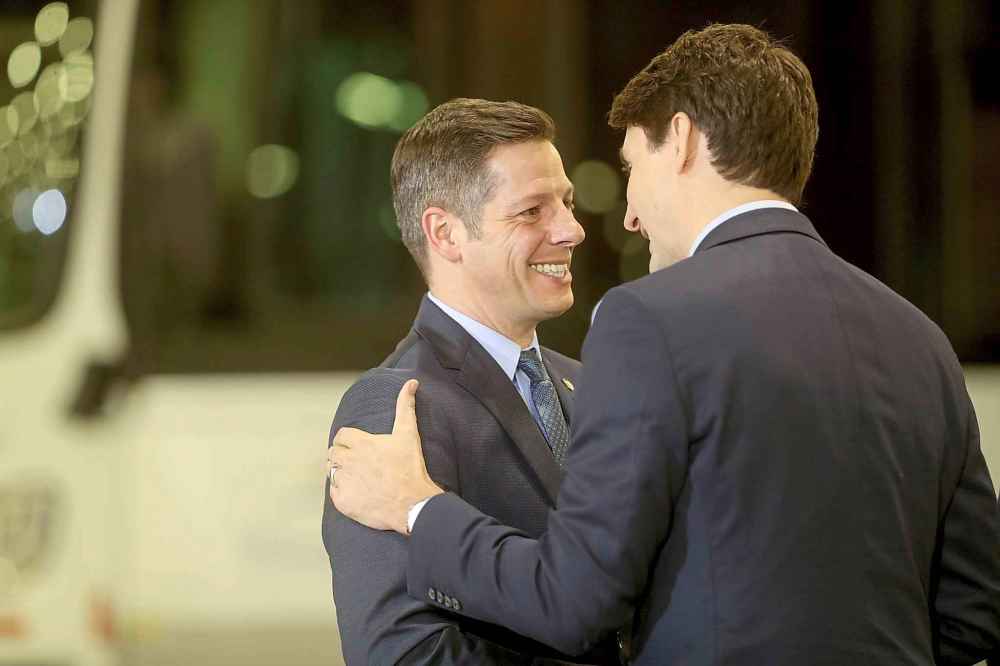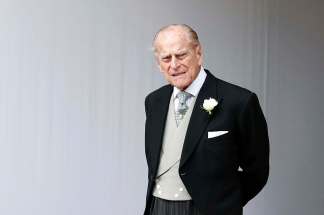PM’s visit highlighted schism between mayor and premier
Read this article for free:
or
Already have an account? Log in here »
To continue reading, please subscribe:
Monthly Digital Subscription
$0 for the first 4 weeks*
- Enjoy unlimited reading on winnipegfreepress.com
- Read the E-Edition, our digital replica newspaper
- Access News Break, our award-winning app
- Play interactive puzzles
*No charge for 4 weeks then price increases to the regular rate of $19.00 plus GST every four weeks. Offer available to new and qualified returning subscribers only. Cancel any time.
Monthly Digital Subscription
$4.75/week*
- Enjoy unlimited reading on winnipegfreepress.com
- Read the E-Edition, our digital replica newspaper
- Access News Break, our award-winning app
- Play interactive puzzles
*Billed as $19 plus GST every four weeks. Cancel any time.
To continue reading, please subscribe:
Add Free Press access to your Brandon Sun subscription for only an additional
$1 for the first 4 weeks*
*Your next subscription payment will increase by $1.00 and you will be charged $16.99 plus GST for four weeks. After four weeks, your payment will increase to $23.99 plus GST every four weeks.
Read unlimited articles for free today:
or
Already have an account? Log in here »
Hey there, time traveller!
This article was published 13/02/2019 (2492 days ago), so information in it may no longer be current.
OTTAWA — Political staff, journalists and MPs from across Canada tuned in Tuesday to watch Prime Minister Justin Trudeau’s response to a minister crashing out of cabinet. They instead saw Mayor Brian Bowman talk about the importance of fast-closing bus doors in a cold climate.
It wasn’t the only bizarre moment from the press conference, which was originally scheduled to focus on upgrades to Winnipeg Transit’s Fort Rouge Garage.
At the podium, Trudeau and Bowman hailed inter-governmental co-operation, but Premier Brian Pallister hadn’t even been invited. This was on the same day when Pallister’s office chided the mayor for “pursuing negotiations through the media”, after the mayor said the premier refused to meet with him.

The press conference illustrates a personality clash that is entrenching disagreements between the federal, provincial and municipal governments, which could risk Winnipeg losing out on badly needed infrastructure upgrades, according to Christopher Adams, a University of Manitoba political scientist.
“It’s seems to be a conflict of personalities as well as priorities,” said Adams, with a province focused on belt-tightening, a federal government doubling down on debt and a city angling to get the most of that cash.
“There’s two different narratives going on,” Adams said.
Despite the absence of the premier, the news conference would have been rather benign. However, earlier in the day Jody Wilson-Raybould, veterans affairs minister and a once rising star in the Trudeau cabinet, resigned in the wake of the government’s handling of the growing SNC-Lavelin scandal.
MP Jim Carr, the sole minister from Manitoba in the federal Cabinet, said he strives for collaboration, but admits that isn’t always what happens.
“Their relationship is not bad; it could always be better,” he said Wednesday.
“I don’t think that Manitobans are particularly happy when governments are not working together to advance the interest of all the people who live in this province.”
Pallister’s office wasn’t caught off-guard by Tuesday’s press conference; his staff had to approve the city’s ability to receive the funding under the federal Public Transit Infrastructure Fund. The province had already spent $14.35 million for the Fort Rouge Garage improvements.
Bowman’s office also downplayed allegations he’s trying to make the premier look bad.
“Government funding announcements don’t typically include governments who don’t have money involved,” wrote city spokesman Jonathan Hildebrand.
He noted the province has done announcements with federal officials within Winnipeg without the city being involved. “It’s a fairly standard practice.”
Yet the three levels of government have clashed before over cost-shared infrastructure projects. In fall 2017, city council shelved eight roadway projects, including a pedestrian-bike bridge over Pembina Highway, after the cash-strapped province restricted its spending.

“We missed an opportunity because the federal government was looking for projects. We put the money on the table; it [was] available.” Liberal MP MaryAnn Mihychuk said last week.
“We needed the province to come in, and they haven’t wanted to dance since we got elected.”
But Adams said it’s not that black-and-white. While the Liberals “have been more generous with the public purse,” the former Conservatives spent heavily to bring the Canadian Museum for Human Rights and numerous infrastructure projects to life in Manitoba.
Cities tied to provincial whims
OTTAWA — Canada’s mayor have been angling for more of a say in how Ottawa makes major funding decisions, citing a rapidly urbanizing country.
But Christopher Adams, a University of Manitoba political scientist, said that’s not likely to happen any time soon, given Canada’s constitution.
“This is not a new problem,” said Adams, noting that there are only two formal levels of government. Experts refer to cities as “creatures of the province,” a term that came about when the Ontario government drastically reduced Toronto’s city council last summer.
OTTAWA — Canada’s mayor have been angling for more of a say in how Ottawa makes major funding decisions, citing a rapidly urbanizing country.
But Christopher Adams, a University of Manitoba political scientist, said that’s not likely to happen any time soon, given Canada’s constitution.
“This is not a new problem,” said Adams, noting that there are only two formal levels of government. Experts refer to cities as “creatures of the province,” a term that came about when the Ontario government drastically reduced Toronto’s city council last summer.
Adams noted that the Manitoba PC government’s budget restraint impedes Winnipeg’s yearning to beef up transit spending, because cities have much fewer powers to levy taxes.
On Wednesday, responding to criticism from Mayor Brian Bowman, the office of Premier Brian Pallister touted its decision to lower taxes, and slagged “the taxes, fees and rate hikes he is imposing on his ratepayers.”
Mayors have cited such criticisms in pushing for more powers. Last month, when the mayors of Canada’s biggest cities gathered in Ottawa, they pushed for an agreement to have permanent meetings with Ottawa, and possibly more funding that doesn’t go through provinces.
Meanwhile, Prime Minister Justin Trudeau has hinted at leaning on mayors for outright support in this fall’s election, calling out “provinces that don’t really have quite the same attitude regarding investing in a tangible way in their communities and big cities.”
Mayors have also decried the federal government for only nudging provinces to allocate some of the tax revenue from legalized cannabis toward cities, instead of compelling them to do so. They decry having to pay most of the policing costs associated with legalization.
Pallister dismissed the idea of sharing that revenue at a meeting last November of Manitoba mayors:
“Don’t ask for a share of profits when there aren’t profits,” he said.
—Dylan Robertson
The Pallister government also matched Ottawa’s $100 million for regional roads within Winnipeg.
His office accused Bowman of “engaging in inaccurate and counterproductive public positioning” by whipping up negative media coverage, despite progress between bureaucrats at both levels.
Bowman’s office did note that a meeting with Pallister last December scheduled for a half-hour was so productive it ballooned to two hours.
“But when there are discrepancies that have not seen progress through the usual channels, an elevated response from the leader of government is required,” Hildebrand wrote.
Adams said regardless of ideology, civil servants rarely come into conflict with colleagues at other levels of government.
“We sometimes get over-fixated by the relationship between elected ministers, premiers and prime ministers,” he said. “There’s this functional thing happening beneath the surface.”
In fact, sources within the federal government – both Liberal-appointed and longstanding bureaucrats — say they actually have a good sense on where Pallister agrees and disagrees, and that surprises have been much less common than the other Prairie premiers.
Some infrastructure projects have gone stagnant, giving Liberal MPs less chances for photo opportunities ahead of this October’s federal vote.
Just over a year ago, Carr proposed three-way meetings between himself, Bowman and the PC government, citing “constant bickering.” It’s unclear whether those meetings bore much fruit.
Similarly, a trilateral task force on methamphetamines took three months to get off the ground, despite police saying the drug’s created a crisis situation.
When media honed in on the project’s scant progress, sources pilloried Ottawa for choosing MP Robert-Falcon Ouellette, deeming him hard to work with. Federal officials found that petty, given the extent of the meth crisis.
“On a number of levels, there seem to be issues of personality,” Adams said.
dylan.robertson@freepress.mb.ca




















